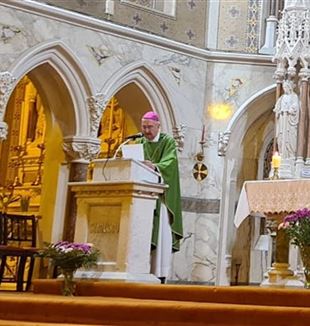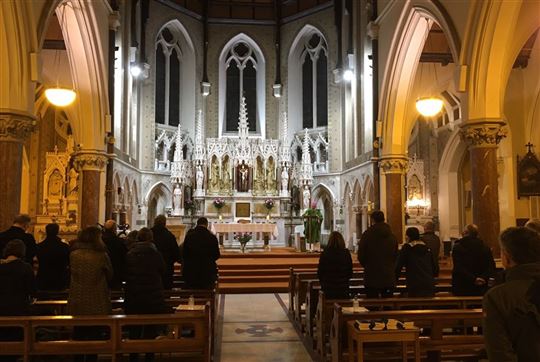
“A creative and invocative charism”
The homily of the Most Reverend Diarmuid Martin, Archbishop Emeritus of Dublin, during mass for the centenary of Fr. Giussani’s birth. Church of the Sacred Heart, Donnybrook, 21 February 2022.After the extraordinary experience for the disciples of the vision of the Transfiguration of Jesus on the mountain, the three apostles return with Jesus back to the harsh realities of every day existence. What do they find? They find groups involved in arguments. The Scribes are arguing with the crowd and with the other disciples. Something had also happened which had made the other disciples uneasy. They had been asked to cast out a devil from a young child but they were unable to do so.
The appearance of Jesus changes the scene. The people are struck with amazement and they run to greet him. The father of the child explains how his son had been possessed and had been suffering immensely since early childhood. He had hoped in vain the Jesus’ disciples might rid the child of an evil spirit.
Jesus’ initial response surprises. He talk of people of no faith and even asks how long he must have to put up with this situation. Initially one might think that Jesus was speaking to the boy’s father. But as often happens Jesus is provoking a reaction. He tries to bring out what faith means and what faith can do. The boy’s father answers that he has faith, but that faith is not perfect and he turns to Jesus to help him in his unbelief. That honest admission is enough for Jesus. Once again we see how a humble and honest declaration of faith is enough for the power of Jesus to break out into lives and he definitely casts the devil out.
How do we attract people to faith in Jesus and not simply argue about it with those whose attitude is hostile? The first thing to remember is that we should be wary in trying to measure the faith of others. The Church can be harsh and judgemental and we can all too easily judge people into categories but those categorises are often of our own making. In today’s complex pluralist culture some still tend to demand black and white answers. You wither fit into our categories of faith 100% or you are not with us.
The community of believers today has to realise that there are many who may seem distant from faith, but who have some faith or perhaps even just remnants of faith. The Church’s task is not to condemn, but to help people overcome their lack of faith and let the power of Jesus be realised into their lives.
This evening we remember Fr. Luigi Giussani on this the anniversary of his birth. We remember his for his ministry and for his special charism which has affected in various ways the lives of each of us here today.
How do we keep alive and develop the charism of Fr. Giussani? Pope Francis has challenged the various apostolic movements in the Church today to re-examine the way they celebrate the charism of their founder and of their movements. You do not foster a charism by putting it into the freezer. We do not preserve the authenticity of a charism by freeze-drying it like a package soup, and think that by adding water now ad then we can recreate it as it was. Package soup never tastes the same as the original product.
How then can movement of CL guarantee the authenticity of the charism of Fr. Giussani? There are two characteristics that I would point out. Firstly. Fr. Giussani was creative and innovative. His charism was not something that was static and could be maintained just as it was. It was creative and invocative in that its aim was to enable people to come to grips with the meaning of faith and to develop a faith which asked questions not in the abstract, but asked each of us to seek ever greater depth in our understanding faith and the place of faith in life. Giussani’s understanding of education was not about formulae which have to be learned and repeated by hear, but about entering into a relationship with the God revealed in Jesus Christ, which would be ever new and ever deeper. To attempt to deep freeze the charism of Giussani would be to betray that very charism.
The second characteristic of Fr. Giussani’s charism was his ability to challenge young people living in a pluralist environment to understand their faith and put it into practice not be establishing a sort of closed faith-ghetto, isolated and safely protected from the realities around them. The originality of his ministry was that it took place not within strictly Catholic institutions but to students who lived within the challenges and the possibilities that reflect the world in which we live, that work of religious pluralism and tolerance, but also of indifference and even of hostility to faith. He spoke to those who were not necessarily 100% card carrying members, but above all those who were, as the man in our Gospel reading, still seeking and looking for someone to help them in their unbelief.
We are living in an important moment of faith life in our world, especially the world marked by Western culture. Pope Francis has launched a synodal process right across the entire Church. Our the years we have had a number of World Synods on various themes and very often they have had sort of sell-by date which was reached when the next Synod was called and the Church moved on to another theme. There are those who may be tempted to think that this will happen with Pope Francis’ synodal journey There are those who many even hope that in two years’ time we will have all this over and finished with and we can move into something else.
I would prefer to look on Pope way. For me this call of Pope Francis will in the long term be as significant as the Second Vatican Council. I remember when the Council was called and each bishop was called to present suggestions on the themes to be on its agenda. Many thought that the Council would simply change or fix few questions. I remember going through the first comments of the Irish Bishops before the Council. They were not particularly inspiring. My predecessor in Dublin hoped that a particular canon of the Code of Canon Law about relations between bishops and religious superiors would finally be clarified, hopefully coming out on the side of the bishops. The then Nuncio spoke about the simplification of rules for taking on an off the mitre in liturgical ceremonies, especially in climates. They failed to foresee what the Council would mean.
Interestingly even Pope John was uncertain and at the opening of the Council said that perhaps it might have to return for second session. Pope John had however one clear vision. The opening homily of the Council was called Gaudet Mater Ecclesia, let Mother the Church rejoice and spoke out clearly against the prophets of doom who only saw problems. If we do not celebrate the Synodal process as an occasion of the joy of being the Church of Jesus Christ, we will fail to understand the Pope's vision.
Pope Francis called the Synod not on Synodality - But "Synodality, Communion, Participation and Mission". Synodality is an ecclesial process. Synodality is not about meetings. It is not about management techniques. It is not just about walking together in a vague way but about renewal of the mission of the Church. Pope John brought about in the Church through a renewed understanding of the relationship between the successor of Peter and the complementary of the college of bishops. It is hard for us to imagine that when earlier Popes proposed to the idea of calling an ecumenical council they were told by theologians that since the definition of Papal infallibility by the first Vatican Council ecumenical councils were no longer needed.
Vatican II did not the definition of Papal infallibility but it rediscovered the richness of the collegiality all the Churches serving with and under the Pope. The synodal path will not overturn the authority of the episcopate or the ministerial priesthood, as some seem to fear, but will rediscover the richness of the communion of all the baptised as a truly explosive source of renewed mission of the Church in today's world.
Here again we can return to the charism of Fr. Giussani. Many of the discussions fostering Synodality are tempted to be reduced to gathering information, to sort of evangelization by a questionnaire. I am not saying that it is not important to foster a culture of listening within the Church. What we require is a special "faith listening" to allow the spirit to be heard more clearly. Fr. Giussani's questioning was not simply about listening, but of interior listening. It was a participation in the search for the heart of the meaning of faith. It was about seeking a Church and a faith far from the idea that we had readymade answers and formulations. It was not a questioning which would lead to ghettoization or a sense of self-centred assurance or of self-superiority by any group, but to a liberation by the Spirit which leads to overcoming self.
A Synodal path which focusses primarily on preoccupation with and analysis of today's situation could be just as far away from what is truly needed as some of the initial reactions to Pope John's Council. The mission which Pope Francis seeks in a synodal process will never be achieved if we are trapped within a culture of individualism and local concerns. It requires participation but participation which is the fruit of communion. The Acts of the Apostles remind us of the extraordinary sense of participation and sharing which were the marks of the early Christian community.
Read also - "A truly ecclesial man"
The Acts of the Apostles also show the courageous ability of the early Church to address the challenges that the Church faced as it expanded into different cultural situations. The model of the early Church can offer us a way to understand Synodality as an ever present dimension of being the Church.
That model is one of a unique sharing which came from the fact that believers gathered to learn from the Word of God and shared in the communion the breaking of the bread.
The challenges of today's world are such as the cure in today's Gospel. They will only be solved by prayer, by prayer not in the sense of formulae, but of humbly opening our hearts to allow us to hear what the Spirit is saying and allowing the Spirit to change us. Without that, efforts will be as fruitless as those of those disciples in our Gospel reading who failed to free that young boy from an evil spirit.
In his humble yet creative and caring and prayerful personal lifestyle, Fr. Giussani with determination allowed his charism to grow and flourish within the Church over the years. We owe it to him to allow that charism to flourish anew and in new ways in the years to come so that can go out to experience the amazement of an encounter with Jesus.#100Initiatives